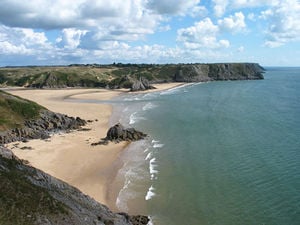
 Beach cleans aren’t just good for the sea – they can boost your mental health and encourage better behaviour, theconversation.com (Jul 19, 2024)
Beach cleans aren’t just good for the sea – they can boost your mental health and encourage better behaviour, theconversation.com (Jul 19, 2024)  ‘Give nature space and it will come back’: rewilding returns endangered species to UK’s south coast, theguardian.com (Jun 27, 2024)
‘Give nature space and it will come back’: rewilding returns endangered species to UK’s south coast, theguardian.com (Jun 27, 2024)  Kelp help? How Scotland’s seaweed growers are aiming to revolutionise what we buy, theguardian.com (Jun 13, 2024)
Kelp help? How Scotland’s seaweed growers are aiming to revolutionise what we buy, theguardian.com (Jun 13, 2024)
Rewilding[edit | edit source]
Sea level rise[edit | edit source]
Societies can adapt to sea level rise in three different ways: implement managed retreat, accommodate coastal change, or protect against sea level rise through hard-construction practices like seawalls or soft approaches such as dune rehabilitation and beach nourishment. Sometimes these adaptation strategies go hand in hand, but at other times choices have to be made among different strategies. For some human environments, such as so called sinking cities, adaptation to sea level rise may be compounded by other environmental issues such as subsidence. Natural ecosystems typically adapt to rising sea levels by moving inland; however, they might not always be able to do so, due to natural or artificial barriers. W
Maps
Land projected to be below annual flood level in 2030 and beyond, coastal.climatecentral.org
Sea Level Rise, information from climatecentral.org
Events[edit | edit source]
No events found.
Resources[edit | edit source]
Video[edit | edit source]
Maps[edit | edit source]
Land projected to be below annual flood level in 2050, coastal.climatecentral.org
Other resources[edit | edit source]
- Marine Climate Change Impacts Partnership
- No Regrets, Planning for Sea Level Rise and Climate, Change and Investing in Adaptation, A Good Practice Guide climatesoutheast.org.uk
- Protecting and sustainably using the marine environment, information from gov.uk
See also[edit | edit source]
- Coastal community activism
- Rewilding UK
- Climate action UK
- Localism UK
- Rural sustainability UK
- Towards sustainable economies UK
- Urban sustainability UK
local information can be found, or shared, via our many UK location pages
External links
- Living Seas, The Wildlife Trusts
- Marine Conservation Society campaigns for clean seas and beaches, sustainable fisheries, and protection of marine life. Through education, community involvement and collaboration, the Marine Conservation Society raises awareness of the many threats that face our seas and promotes individual, industry and government action to protect the marine environment. The Marine Conservation Society provides information and guidance on many aspects of marine conservation and produces the Good Fish Guide as well as involving thousands of volunteers in projects and surveys such as Beachwatch.[1] added 16:15, 4 May 2021 (UTC)
- Blue New Deal, "...stronger economies for UK coastal communities through a healthier marine environment."
- #2minutebeachclean
References



